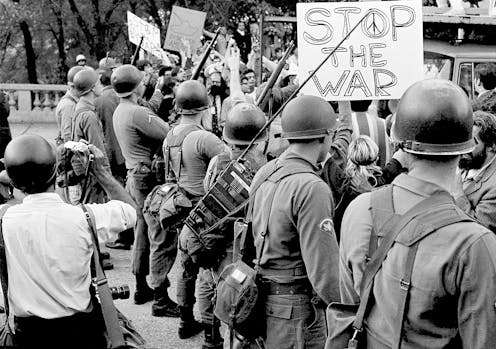How the 'Heat and Light' of 1968 still influence today: 3 essential reads
- Written by Jonathan Gang, Editorial Researcher and Multimedia Producer

Editor’s note: As we come to the end of the year, Conversation editors take a look back at the stories that – for them – exemplified 2018.
This year, The Conversation US marked the 50th anniversary of 1968 with our first podcast, “Heat and Light[1].” Hosted by journalist Phillip Martin, the show explored lesser-known stories from that pivotal year through interviews with scholars who have dedicated their lives to studying them. Here are three of my favorite episodes that revealed surprising insights about how 1968 changed the course of history – and how it still shapes our world today.
1. The first interracial kiss on television
On Nov. 28, 1968, the right for interracial couples’ to marry[2] in the U.S. was just over a year old. A majority of Americans still disapproved of marriages between whites and people of color[3]. On that day the science fiction show “Star Trek” broadcast the first interracial kiss[4] on American television between William Shatner, a white man, and Nichelle Nichols, a black woman. Matt Delmont, professor of history at the Arizona State University, told us why this seemed so far-fetched to the viewers of the day[5], despite taking place in the future and on another planet, with the participants placed under mind control by aliens.
However, as far as America has come toward normalizing interracial love, there is plenty of evidence that shows these relationships are still not totally accepted[6].
2. The birth of Silicon Valley
In the cascade of political and cultural milestones and anniversaries from 1968, it’s easy to overlook the fact that the year was a watershed moment for the technology industry.
Margaret O'Mara, a professor of history at the University of Washington, explained that 1968 can be thought of as the year the Santa Clara Valley in Northern California began its transformation into what is now known as the Silicon Valley. It was the year that saw the founding of microprocessor manufacturer Intel and the debut of the computer mouse at an event that would come to be known as the “Mother of All Demos[7].”
All of this innovation, however, came with consequences – including environmental degradation and rising income inequality – that still affect many residents of the former “valley of heart’s delight.”[8]
3. The protest movement … backfires?
1968, much like 2018, was a year of protest. Across the country and around the world, people filled the streets to rail against the war in Vietnam and racial and economic inequality. Students rose up[9] across the country. The Democratic National Convention in Chicago[10] dissolved into chaos and violence. Days of unrest followed the assassination of Martin Luther King Jr.[11] in April.
However, despite its reputation as a year of liberal, anti-establishment protest, 1968 was also the start of two decades of nearly unbroken Republican control of the presidency. Arizona State University history professor Donald Critchlow[12] explained how, as the left filled the streets across the country, they may have driven many voters concerned with “law and order”[13] to Richard Nixon and the Republican Party.
Critchlow, himself a former member of the 1968 protest movement who has since drifted from radical leftist to conservative historian, says that this is a phenomenon that may repeat itself in 2020. It’s a lesson – and a warning – that those looking to resist the Trump administration[14] in 2019 may want to take to heart.
References
- ^ Heat and Light (heatandlightpod.com)
- ^ to marry (www.oyez.org)
- ^ marriages between whites and people of color (news.gallup.com)
- ^ interracial kiss (www.youtube.com)
- ^ far-fetched to the viewers of the day (theconversation.com)
- ^ these relationships are still not totally accepted (theconversation.com)
- ^ Mother of All Demos (theconversation.com)
- ^ “valley of heart’s delight.” (theconversation.com)
- ^ Students rose up (theconversation.com)
- ^ Democratic National Convention in Chicago (theconversation.com)
- ^ assassination of Martin Luther King Jr. (www.theatlantic.com)
- ^ Donald Critchlow (theconversation.com)
- ^ voters concerned with “law and order” (theconversation.com)
- ^ resist the Trump administration (theconversation.com)
Authors: Jonathan Gang, Editorial Researcher and Multimedia Producer

